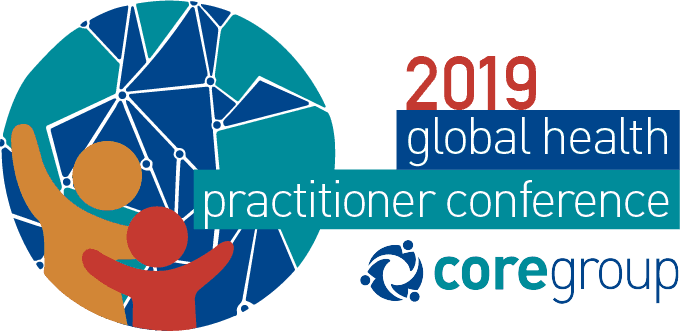
Conference Overview
The 2019 Global Health Practitioner Conference on May 6-9 in Bethesda, Maryland, USA welcomed 332 implementers, academics, donors, private sector, and other community health advocates from over 14 countries representing over 107 organizations to explore the dynamic and ever-evolving profile of partnerships existing between different stakeholders working to advance community health at various levels of policy and implementation. The conference also highlighted different innovations for community health work, from technology to methodologies and processes. The objectives were:
- EXAMINE the successful elements that contribute to meaningful partnerships for results at the community, national, regional and global levels
- SHARE innovative health models that can be scaled; determine how as a community we can address gaps in scaling up known evidence-based models
- CATALYZE plans for consortium building, technical capacity building and strategic focus for improved community health, in a cross-sectoral manner
Session Presentations: Monday | Tuesday | Thursday
New Information Circuits | Poster Session
Program Booklet | Conference Report (upcoming!)
Innovation Speaker
 Mario Merialdi, Senior Director, BD Global Health
Mario Merialdi, Senior Director, BD Global Health
Dr. Mario Merialdi is tasked to help lead the maternal and newborn health strategy and establish BD’s technologies and market position in this important area of unmet health need. He works closely with the BD’s Medical Affairs function, BD’s geographic regions and with the Greater Asia R&D organization to advance plans for clinical trials and development of the BD Odon Device. Dr. Merialdi joined BD in 2014 from the World Health Organization (WHO), where he most recently held the position of Coordinator in the Department of Reproductive Health and Research. Dr. Merialdi achieved his medical degree at Parma University, Italy and subsequently obtained a Master of Public Health and PhD in International Health from the Bloomberg School of Public Health at Johns Hopkins University. In 2001, Dr. Merialdi joined WHO in the Department of Reproductive Health and Research, as a Medical Officer.
Plenary Session
10:30 AM – 12:00 PM
Playing in the Sandbox for Maximum Impact: Defining Collaboration Across Corporations, Governments, Private Sector, and Implementers
PRESENTERS: Tara Hogan Charles, The Procter and Gamble Company; Scott Higgins, Merck for Mothers; Myroslava Tataryn, Wellspring Philanthropic Fund; Rob Tashima, VilCap Innovations | MODERATOR: Janine Schooley, Project Concern International
As government and global priorities evolve, there are new and additional pressures as well as opportunities for overcoming challenges and maximizing the leverage and synergistic benefits that can come from true collaboration between among civil society, governments, corporate and other private sector actors. With ever increasing pressures on budgets, bandwidth and the drive for impact, more meaningful engagement with the private sector is essential, and practical means of achieving it is an increasingly high priority for CORE Group, its members and all others who are striving for more sustainable, community-led impact. This exciting plenary brought together diverse perspectives to stimulate ideas for overcoming challenges, learn from what has worked and what has not worked, and strategize about what can be done to improve how we “play in the sandbox” for maximum impact.
Concurrent Sessions
3:30 AM – 5:00 PM
Breaking Barriers to Improve Health and Nutrition: What It Will Take to Strengthen Health Services to Better Address Nutritional Status
PRESENTERS: Smita Kumar, USAID; Sascha Lamstein, USAID Advancing Nutrition, John Snow Inc.; Grace Funnell, Action Against Hunger; Patti Welch, USAID’s flagship Maternal & Child Survival Program, PATH; Justine Kavle, USAID’s flagship Maternal & Child Survival Program, PATH | MODERATOR: Cori Mazzeo, USAID’s flagship Maternal & Child Survival Program, Save the Children
Health and nutrition are interrelated, especially during the critical early years of life. Inadequate nutrition, sub-optimal care, and poor feeding practices put newborns, infants, and young children at higher risk of disease and mortality, and disease puts children at greater risk of becoming malnourished. Despite this, primary health care providers often fail to recognize undernutrition in children while treating illnesses and community health workers are inadequately prepared or empowered to address childhood illnesses. Among the population of children under five years of age, small and sick newborns are often neglected in program design and implementation, even while they require more specialized attention beyond what is typically provided. Improving the care and feeding of this vulnerable population within the context of health programming is essential to ensure that they survive and thrive. This session aimed to educate about the evidence and global guidance for strengthening nutrition services as an integral part of routine health services for newborns, infants, and young children. The session discussed successful approaches to doing so at each level of the health system.
Presentation_Kavle | Presentation_Lamstein | Presentation_Welch | Presentation_Arabi | Presentation_Kumar
Moving Nutrition Innovation from Inception to Deployment to Scale
PRESENTERS: Susan Abdel-Rahman, Children’s Mercy Hospital; Kristen Mallory, Children International; Pamela Sheeran, Smile Train
Given the well documented adverse effects of childhood malnutrition, scaling innovation that effectively prevents, identifies and/or treats those at risk for acute undernutrition, is critical. Children’s Mercy Hospital in Kansas City developed a tool to determine age- and gender-specific MUAC z-scores through an arm band device that can detect over and underweight for children 2 months-18 years old. After validation in a hospital setting they partnered with Children International to test this tool in Guatemala and India by training mothers and volunteers to more effectively address malnutrition in their communities. Smile train recently scaled innovative training materials to prevent and treat malnutrition among their cleft populations. This session told a story from three unique lens about challenges, solutions and how important steps and considerations along that path are crucial to scaling innovation that works. Experiences from the group were combined to create a framework to support future innovation and partnerships to more effectively and consistently reach more children around the world at scale.
Using Innovations and Partnerships in Digital Technologies to Strengthen Humanitarian Response
PRESENTERS: Walter Kerr, Zenysis Technologies; Kim Shelsby, Chemonics; Tamara Goldschmidt, BAO Systems| MODERATOR: Mai-Anh Hoang, Chemonics
Through global, regional, and hyper local public-private partnerships many organizations and companies are making significant progress in improving real-time information, predicative analytics, supply chain networks, and the delivery of product and services. Market leaders like Amazon and Walmart have revolutionized supply chain and demonstrated what is possible in the countries we work in. Other eCommerce leaders like Uber and AirBnB have developed new, innovative, asset-light business models that can create promising new opportunities in the countries we work in. And, analytical platforms such as that from Zenysis Technologies and BAO Systems integrate fragmented data, providing on-demand analytics that can uncover insights at unprecedented speed. In this session, we will discuss how we can adapt high tech and high-resource technologies to the challenges and circumstances we face every day to meet the needs of the people we serve. The session discussed how tools and solutions that were designed for resource-rich markets can now be used and accessed in in low-resource environments where we face challenges such as poor infrastructure, connectivity, and weak governance.
Presentation_General | Presentation_Kerr | Presentation_Shelsby | Presentation_Goldschmidt
Partnerships for Positive Change in the Era of Universal Health Coverage
PRESENTERS: Mychelle Farmer, NCD Child; Jane Otai, Jhpiego
This interactive session, organized in partnership with young health advocates, aimed to provide unique insight into youth perspectives on confidential health services and a rights-based approach to health in the era of universal health coverage (UHC). At least half of the world’s population lacks coverage for comprehensive health services, including the majority of adolescents and youth living in low- and middle-income countries. Universal health coverage (UHC) offers the opportunity to limit personal or family costs for health care services, but adolescent health services, including confidential services, may be threatened by national guidelines for UHC. The session aimed to benefit participants by learning first-hand about youth experiences accessing confidential clinical care for mental health, reproductive health, and related services. Participants reviewed national policies, with a critical assessment of UHC as it either supports or challenges adolescent and youth confidential health services. Youth partnerships with civil society organizations at national and global levels will be described, to determine ways to preserve a rights-based approach to health in the era of UHC.
Public-Private Partnership and Chronic Kidney Disease of Unknown Causes (CKDu)
PRESENTERS: World Vision; PAHO; INSP (Mexican National Institute of Public Health); Sugar Mill
The US Department of Labor, through World Vision funds Campos de Esperanza (CdE), is a four-year project whose goal is to reduce child labor in migrant agricultural communities in Mexico, particularly in the sugarcane and coffee sectors. The project reduces child labor by (1) improving working conditions for agricultural workers and (2) creating linkages for migrant children and their families to participate in existing education, training and social protection programs in order to strengthen their livelihoods. The project is developing a knowledge exchange platform and convening international learning exchanges for stakeholders as part of its OSH component activities. The workshop aimed to feature mechanisms and approaches taken during process implementation to build successful private-public partnerships to prevent and/or manage the non-communicable disease, as well as identify critical roles communities can play in protecting children and youth in the workplace.
Presentation_NCDs | Presentation_Wesseling | Presentation_World Vision | Presentation_Behar
